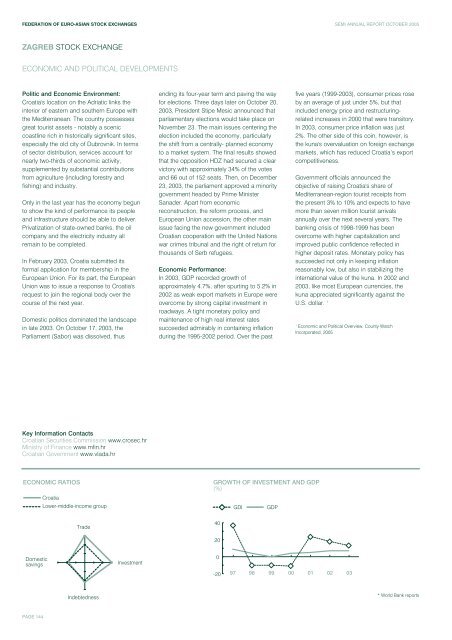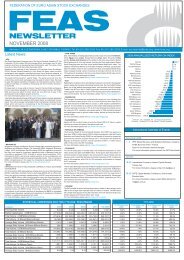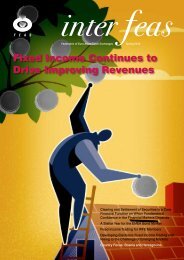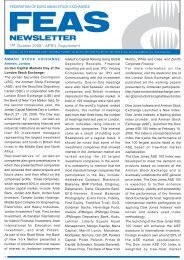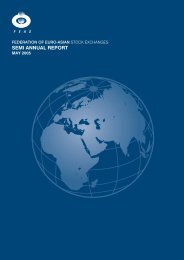Download - FEAS
Download - FEAS
Download - FEAS
Create successful ePaper yourself
Turn your PDF publications into a flip-book with our unique Google optimized e-Paper software.
FEDERATION OF EURO-ASIAN STOCK EXCHANGES SEMI ANNUAL REPORT OCTOBER 2005<br />
ZAGREB STOCK EXCHANGE<br />
ECONOMIC AND POLITICAL DEVELOPMENTS<br />
Politic and Economic Environment:<br />
Croatia's location on the Adriatic links the<br />
interior of eastern and southern Europe with<br />
the Mediterranean. The country possesses<br />
great tourist assets - notably a scenic<br />
coastline rich in historically significant sites,<br />
especially the old city of Dubrovnik. In terms<br />
of sector distribution, services account for<br />
nearly two-thirds of economic activity,<br />
supplemented by substantial contributions<br />
from agriculture (including forestry and<br />
fishing) and industry.<br />
Only in the last year has the economy begun<br />
to show the kind of performance its people<br />
and infrastructure should be able to deliver.<br />
Privatization of state-owned banks, the oil<br />
company and the electricity industry all<br />
remain to be completed.<br />
In February 2003, Croatia submitted its<br />
formal application for membership in the<br />
European Union. For its part, the European<br />
Union was to issue a response to Croatia's<br />
request to join the regional body over the<br />
course of the next year.<br />
Domestic politics dominated the landscape<br />
in late 2003. On October 17, 2003, the<br />
Parliament (Sabor) was dissolved, thus<br />
Key Information Contacts<br />
Croatian Securities Commission www.crosec.hr<br />
Ministry of Finance www.mfin.hr<br />
Croatian Government www.vlada.hr<br />
ECONOMIC RATIOS<br />
Domestic<br />
savings<br />
PAGE 144<br />
Croatia<br />
Lower-middle-income group<br />
Trade<br />
Indebtedness<br />
Investment<br />
ending its four-year term and paving the way<br />
for elections. Three days later on October 20,<br />
2003, President Stipe Mesic announced that<br />
parliamentary elections would take place on<br />
November 23. The main issues centering the<br />
election included the economy, particularly<br />
the shift from a centrally- planned economy<br />
to a market system. The final results showed<br />
that the opposition HDZ had secured a clear<br />
victory with approximately 34% of the votes<br />
and 66 out of 152 seats. Then, on December<br />
23, 2003, the parliament approved a minority<br />
government headed by Prime Minister<br />
Sanader. Apart from economic<br />
reconstruction, the reform process, and<br />
European Union accession, the other main<br />
issue facing the new government included<br />
Croatian cooperation with the United Nations<br />
war crimes tribunal and the right of return for<br />
thousands of Serb refugees.<br />
Economic Performance:<br />
In 2003, GDP recorded growth of<br />
approximately 4.7%, after spurting to 5.2% in<br />
2002 as weak export markets in Europe were<br />
overcome by strong capital investment in<br />
roadways. A tight monetary policy and<br />
maintenance of high real interest rates<br />
succeeded admirably in containing inflation<br />
during the 1995-2002 period. Over the past<br />
GROWTH OF INVESTMENT AND GDP<br />
(%)<br />
40<br />
20<br />
0<br />
-20<br />
97<br />
GDI GDP<br />
five years (1999-2003), consumer prices rose<br />
by an average of just under 5%, but that<br />
included energy price and restructuringrelated<br />
increases in 2000 that were transitory.<br />
In 2003, consumer price inflation was just<br />
2%. The other side of this coin, however, is<br />
the kuna's overvaluation on foreign exchange<br />
markets, which has reduced Croatia’s export<br />
competitiveness.<br />
Government officials announced the<br />
objective of raising Croatia's share of<br />
Mediterranean-region tourist receipts from<br />
the present 3% to 10% and expects to have<br />
more than seven million tourist arrivals<br />
annually over the next several years. The<br />
banking crisis of 1998-1999 has been<br />
overcome with higher capitalization and<br />
improved public confidence reflected in<br />
higher deposit rates. Monetary policy has<br />
succeeded not only in keeping inflation<br />
reasonably low, but also in stabilizing the<br />
international value of the kuna. In 2002 and<br />
2003, like most European currencies, the<br />
kuna appreciated significantly against the<br />
U.S. dollar. 1<br />
1 Economic and Political Overview, County Watch<br />
Incorporated, 2005<br />
98 99 00 01 02 03<br />
* World Bank reports


